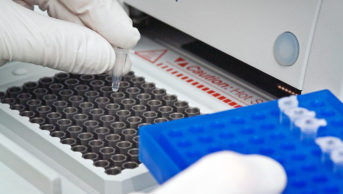
Shutterstock.com
The delivery of a pharmacogenomics and pharmaceutical clinical decision support service worth £66m is no longer going ahead, a spokesperson for the University of Glasgow has confirmed.
The Pharmacogenomics Informed Medications Management service, tendered by NHS Scotland in November 2021, aimed to use genomic data to improve the management of polypharmacy in primary and secondary care.
The service was expected to include the use of a pharmacogenetic panel, whereby multiple genetic variants that affect drug responses are tested simultaneously and stored in a patient’s electronic medical record.
This would have provided prescribers with clinically actionable pharmacogenomics information while prescribing relevant drugs.
However, on 14 September 2024, a spokesperson for the University of Glasgow, which was project lead for the service, told The Pharmaceutical Journal that “the procurement did not go ahead”. The Scottish government was unable to provide any further information on the cancellation.
The procurement comprised two phases. Phase one was valued at £66m and aimed to involve 10,000–20,000 patients in a clinical trial in the Glasgow area to determine the clinical and economic viability of the service.
Following the trial’s completion, a decision would have been made to terminate or extend the procurement into phase two: the potential widespread adoption of the service across NHS Scotland.
Commenting on the cancellation, Sarah Scott, policy and public relations pharmacist at Community Pharmacy Scotland, said: “It is unfortunate to read that the Pharmacogenomics Informed Medications Management service has been cancelled.
“As pharmacogenomics, as an area, develops and expands in time, community pharmacy in Scotland looks forward to taking part in harnessing the use of this technology to better improve patient care. We look forward to further service development in this area.”
In April 2024, the Scottish government published the ‘Genomic medicine strategy 2024 to 2029’ to establish a “robust national genomic medicine service” that prioritised workforce and education; data and digital infrastructure; and research, development and innovation.
The five-year strategy outlined several ambitions, including the development of collaborative multidisciplinary genomic testing services, the development of national genomic test directories for healthcare professionals and improved clinical management pathways for people with cancer and rare and inherited conditions.
Laura Wilson, director for Scotland at the Royal Pharmaceutical Society, said: “Pharmacogenomics has the potential to transform patient care, and we are pleased that the Scottish government recognises the enormous potential of pharmacogenomics for the health and social care system in Scotland.
“In order that this potential is realised, investment is required.”
“We are fully supportive of [the] Scottish government’s genomic medicine strategy. We would be interested to understand the rationale for the Pharmacogenomics Informed Medications Management service not proceeding and will continue to work with [the] Scottish government to ensure that the benefits of pharmacogenomics for patient care continue to be well understood and adequately resourced,” she added.
A spokesperson for the Scottish government told The Pharmaceutical Journal that, following a separate project on medicines optimisation, it was looking to include pharmacogenomics in medicines reviews.
“We recently led the three-nation iSIMPATHY project with Ireland and Northern Ireland,” they said.
“This comprised of over 6,000 polypharmacy reviews, using the patient-centred 7-step methodology. The project delivered improved patient outcomes and medication safety, at reduced costs.
“There are now plans to extend the use of the 7-step methodology to include pharmacogenomic testing. We are exploring options to do so, in partnership with other key stakeholders.”


